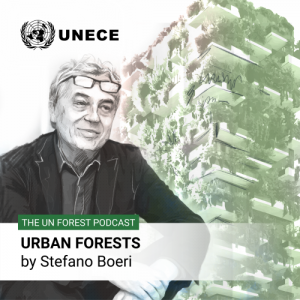Trees belong in cities. Yet, as cities across the globe get bigger, trees and green spaces are lost to new buildings and infrastructure. With less than 20 percent of ground area covered by tree crowns, on average, cities all over the world need many more trees than they have today.
But why? Why do we need to bring nature back into people’s neighborhoods?
In the first episode of the UN Forest Podcast – “Urban forests hosted by Stefano Boeri” – architect and professor at Politecnico di Milano, Stefano Boeri, and Cecil Konijnendijk, professor of urban forestry researcher and contributor to many UNECE urban forest publications, discuss how we can expand green space areas across cities that are often very dense and how can we guarantee that the benefits of urban forests are provided in a sound and inclusive way.
They both agree that cities are better off with trees. Urban forests are beneficial to human well-being, support biodiversity and provide economic benefits. In Mr. Boeri’s words, “urban greening is not an option, but the most effective, cost-effective and inclusive choice to counter the effects of climate change” and create a sustainable future.
Often, however, green spaces are not equally distributed across neighborhoods. “If we do not bring green spaces to people, all people, in cities,” stresses Prof. Konijnendijk, “then these people really will miss out on some essential benefits.” If all urban dwellers lived within 300 meters of a green space, as the World Health Organization recommend, 43.000 premature deaths could be prevented, a new study found. This speaks to the importance of distributing trees equitably, regardless of income or status.
This is also when Prof. Konijnendijk’s 3-30-300 rule comes into play. It calls for every resident to be able to see at least 3 trees from their home and live in a neighborhood with at least 30% tree canopy cover, with the nearest public green space no further than 300 meters from their door. (Nature Based Solutions Institute) This formula supports green cities where no one is left behind.
The key priority for cities is to first and foremost conserve the green species and trees they already have, improve, and expand them. With limited spaces in our dense cities, city planners and architects face a massive challenge to keep and integrate more nature into cities. Vertical forests, that are homes to people and biodiversity, are one way to do so by returning part of the built space to nature. A pioneer of buildings that combine high-density residential development with tree planting in city centers, Stefano Boeri designed and built the first prototype in Milan in 2014. Stefano Boeri Architetti has since designed vertical forests all over the world, including the first Vertical Forest for social housing in Eindhoven, the Netherlands, as well as projects in Huanggang, China and in Cairo, Egypt. Proper planning, good management, and long-term, comprehensive, and integrated programmes that bring onboard all key players are essential for expanding tree coverage in cities. Successful urban greening projects need sound strategies, policies, legislation, appropriate funding and resources, but community-based activities are also needed.
Let our first UN Forest Podcast episode inspire you. Find opportunities to grow, care for and support trees and forests on your property and in your community. Contribute to a local tree-planting project and share the importance of urban forestry with your friends, your family, your neighbors and your political representatives. We can definitely all play a part.
Note to editors
You can listen to the episode “Urban forests hosted by Stefano Boeri” on Spotify, SoundCloud, Apple Podcasts, and Amazon Music.
The UN Forest Podcast is a series produced by UNECE to showcase that the potential of forests goes beyond trees. Each episode features special guests and speakers who bring you insights on forests as our strongest allies in fighting climate change and creating a sustainable future for ourselves and generations to come.


